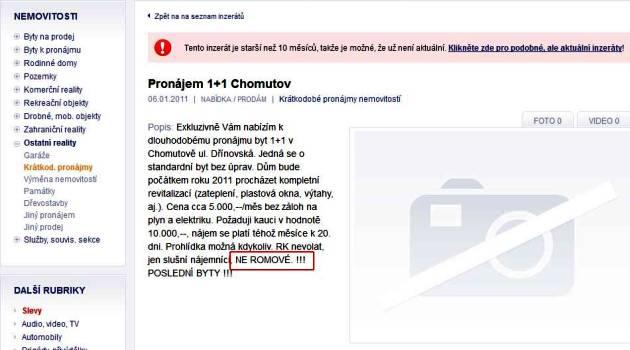Czech Constitutional Court orders discrimination cases reopened

The Czech Constitutional Court (Ústavní soud – ÚS) has ordered that a case of Romani people who made a reservation at a hotel in Most but were not given a room upon arrival be reopened. According to the original verdict, discrimination on the basis of their ethnicity was not proven, but the ÚS believes doubts persist as to whether the defense argument of the hotel was not itself tendentious.
The High Court in Prague must now reopen the case. The parties to the dispute did not attend the reading of the finding on 13 October.
The incident occurred 10 years ago, when three Romani people from the Ostrava area wanted to stay in a motel in November 2005 but were told there was no vacancy. From the reception area of that motel they called a different facility in Most which promised them accommodation.
After they arrived at the Hotel Cascade, however, the staff announced to them that they did not have any vacancies after all. Both men viewed this as discirmination based on the fact that they are members of the Romani minority.
The Romani customers later filed suit asking the hotel operator to apologize and pay CZK 25 000 compensation. The Regional Court in Ústí nad Labem and the High Court in Prague rejected their suit.
Allegedly the Romani plaintiffs did not manage to prove that the actual reason they were denied accommodation services was their origin. On the contrary, the hotel allegedly documented that it treats guests of any ethnicity, nationality or race equally.
For the date in question, the hotel provided the court with an reservation for all of its rooms from a German entrepreneur who allegedly ultimately never made use of it. According to the complaint filed with the Constitutional Court, however, there are discrepancies between the different pieces of evidence presented by the hotel.
The case is said to represent a "classic, notorious" situation that Romani people encounter when seeking accommodation or work. On the telephone they are promised access to what they seek, but when they show up in person, suddenly everything is different.
According to the Constitutional Court justices, in the Most case the hotel operators did not manage to unambiguously refute the discrimination claim. They did not submit any further information regarding the unused reservation of all 156 rooms, such as a list of potential guests or the purpose of their travel.
"The ÚS is of the opinion that the evidence presented does not resolve doubts as to whether the display of this reservation happened as a mere formality for the purpose of subsequently justifying the behavior of the hotel employees," Justice-Rapporteur Pavel Rychetský said. While the staff never said anything openly racist to the Roma, that does not rule out the possibility of discrimination.
"The notion that this motivation would be expressly communicated to those affected is illusory. Even though such a situation can of course be conceived of, in everyday reality that will be the exception, not the rule," Rychetský said.
According to the Justice-Rapporteur, the lower courts have made an error. "They have grossly violated both the rules banning discrimination and the rules established by the Code of Civil Procedure," he told Czech Radio.
The Constitutional Court also said that in the proceedings before the lower courts, the plaintiffs proved that the hotel employees refused them accommodation after originally promising it on the phone. "There is, therefore, no dispute over whether they have met their obligation to substantiate their claims or whether they have submitted facts that sufficiently justify the conclusion that discrimination might have played a role here. It would be, therefore, on the company running the hotel to prove that discrimination did not occur," the finding reads.
While such treatment, according to many Romani activists, is common, it is not frequently reviewed in court. The justice system did handle a case from 2001, for example, in which a Romani man was refused entry to a discotheque in a town in West Bohemia.
In that case the courts acknowledged he had been discriminated against on the basis of ethnicity. Two years after that, another case involved a Romani woman and her friend seeking accommodation at a residential hotel.
The manager told them there were no vacancies. Other non-Romani customers who approached the manager afterwards as part of a test case were then rented a two-room apartment in the facility.
The woman filed suit for protection of personality. The court awarded her financial compensation.
This year the District Court in Litoměřice reviewed the case of a real estate broker who rejected a Romani client with the explanation that the landlord did not want Romani tenants. The court awarded the plaintiff the right to an apology but not compensation in the amount of CZK 100 000; the case was test involving the Office of the Ombudsman.
